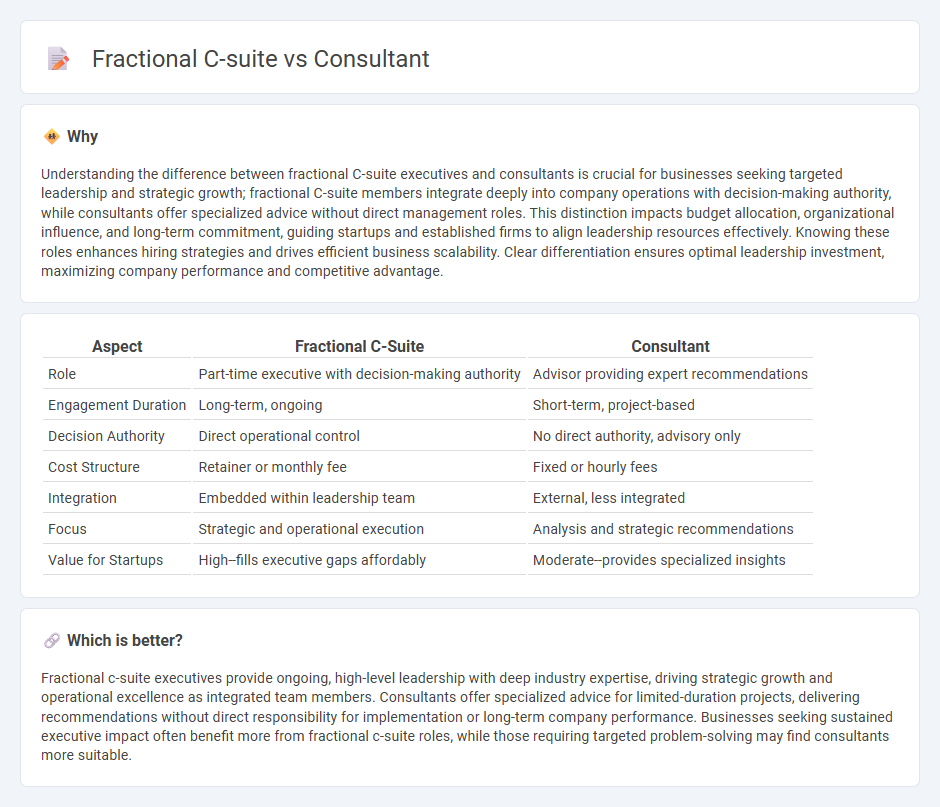
Fractional C-suite executives offer hands-on leadership and strategic decision-making within a company, integrating directly with internal teams to drive growth and operational efficiency. Consultants provide expert advice and insights from an external perspective, focusing on problem-solving and recommendations without direct management responsibility. Explore how leveraging fractional C-suite talent or consultancy can impact your business growth and innovation strategies.
Why it is important
Understanding the difference between fractional C-suite executives and consultants is crucial for businesses seeking targeted leadership and strategic growth; fractional C-suite members integrate deeply into company operations with decision-making authority, while consultants offer specialized advice without direct management roles. This distinction impacts budget allocation, organizational influence, and long-term commitment, guiding startups and established firms to align leadership resources effectively. Knowing these roles enhances hiring strategies and drives efficient business scalability. Clear differentiation ensures optimal leadership investment, maximizing company performance and competitive advantage.
Comparison Table
| Aspect | Fractional C-Suite | Consultant |
|---|---|---|
| Role | Part-time executive with decision-making authority | Advisor providing expert recommendations |
| Engagement Duration | Long-term, ongoing | Short-term, project-based |
| Decision Authority | Direct operational control | No direct authority, advisory only |
| Cost Structure | Retainer or monthly fee | Fixed or hourly fees |
| Integration | Embedded within leadership team | External, less integrated |
| Focus | Strategic and operational execution | Analysis and strategic recommendations |
| Value for Startups | High--fills executive gaps affordably | Moderate--provides specialized insights |
Which is better?
Fractional c-suite executives provide ongoing, high-level leadership with deep industry expertise, driving strategic growth and operational excellence as integrated team members. Consultants offer specialized advice for limited-duration projects, delivering recommendations without direct responsibility for implementation or long-term company performance. Businesses seeking sustained executive impact often benefit more from fractional c-suite roles, while those requiring targeted problem-solving may find consultants more suitable.
Connection
Fractional C-suite executives and consultants both provide specialized expertise to startups and growing businesses seeking strategic leadership without the full-time commitment. Fractional executives often focus on operational management and long-term company growth, while consultants tend to deliver targeted advice and problem-solving solutions for specific challenges. This complementary relationship enhances entrepreneurial ventures by combining hands-on leadership with expert guidance.
Key Terms
Expertise
Consultants provide specialized advice on specific projects or challenges, delivering targeted expertise without long-term commitment. Fractional C-suite executives offer ongoing leadership and strategic guidance, integrating deeply into company operations while sharing their high-level experience across multiple organizations. Explore the distinct advantages of both roles to determine which best aligns with your business needs.
Commitment
Consultants provide expert advice on a project or task basis without ongoing organizational commitment, offering flexibility and specialized knowledge for short-term needs. Fractional C-suite executives bring dedicated leadership with a partial but sustained commitment, integrating deeply into company strategy and operations over a set period. Explore the differences further to determine which leadership model best suits your business goals and resource allocation.
Authority
A fractional C-suite executive holds delegated decision-making power within an organization, often managing key strategic initiatives and leading teams with direct authority over resources. Consultants provide expert advice and recommendations without formal authority, influencing outcomes through expertise rather than executive power. Explore the distinct roles and decision-making impacts of both to determine the best fit for your company's leadership needs.
Source and External Links
Consultant - Wikipedia - A consultant is a professional expert who provides advice or services in a specialized area to organizations, helping to diagnose problems and create workable solutions within various industries.
What Is a Consultant? Definition and How To Become One - Indeed - A consultant is an experienced professional with broad and deep knowledge in a subject who advises clients, either as internal staff or external service providers, to improve business functions across many fields such as management, law, healthcare, and finance.
Consulting job description - TargetJobs - Consultants help organizations solve problems, manage change, and improve efficiency by analyzing data, developing strategies, implementing solutions, and often work in fields like management, IT, finance, and marketing.
 dowidth.com
dowidth.com